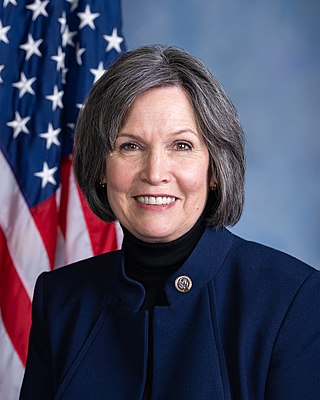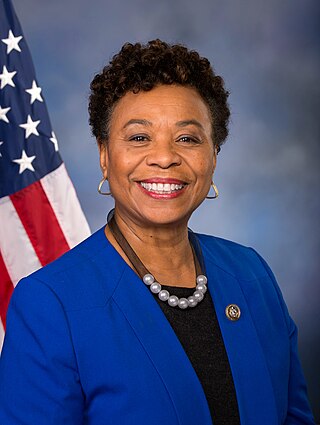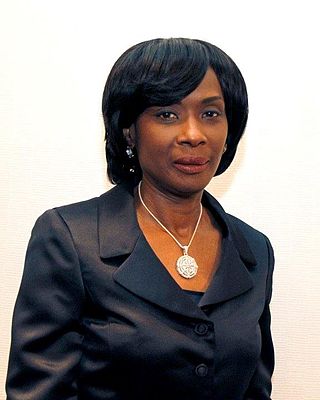
Betty Louise McCollum is an American politician serving as the U.S. representative for Minnesota's 4th congressional district, serving since 2001. She is a member of the Democratic-Farmer-Labor Party (DFL). McCollum's district centers on St. Paul, Minnesota's capital city. She is the second woman elected to Congress from Minnesota. McCollum became the dean of Minnesota's congressional delegation in 2021.

Barbara Jean Lee is an American politician and social worker who has served as a U.S. representative from California since 1998. A member of the Democratic Party, Lee represents California's 12th congressional district, which is based in Oakland and covers most of the northern part of Alameda County. According to the Cook Partisan Voting Index, it is one of the nation's most Democratic districts, with a rating of D+40.

Yvette Diane Clarke is an American politician serving as the U.S. representative for New York's 9th congressional district since 2013. A member of the Democratic Party, she first entered Congress in 2007, representing New York's 11th congressional district until redistricting. Clarke represented the 40th district in Brooklyn on the New York City Council from 2002 to 2006.

Bonnie M. Watson Coleman is an American politician. She has served as the U.S. representative for New Jersey's 12th congressional district since 2015. She is a member of the Democratic Party. Watson Coleman served in the New Jersey General Assembly, from 1998 to 2015 for the 15th legislative district. She is the first African-American woman to represent New Jersey in Congress.
The social determinants of health (SDOH) are the economic and social conditions that influence individual and group differences in health status. They are the health promoting factors found in one's living and working conditions, rather than individual risk factors that influence the risk or vulnerability for a disease or injury. The distribution of social determinants is often shaped by public policies that reflect prevailing political ideologies of the area.

Karen Ruth Bass is an American politician, social worker and former physician assistant who has served as the 43rd mayor of Los Angeles since 2022. A member of the Democratic Party, Bass previously served in the U.S. House of Representatives from 2011 to 2022 and in the California State Assembly from 2004 to 2010, serving as speaker during her final Assembly term.

Frederica Smith Wilson is an American politician who has been a member of the United States House of Representatives since 2011, representing Florida's 24th congressional district. Located in South Florida, Wilson's congressional district, numbered 17th during her first term, covers a large swath of eastern Miami-Dade County and a sliver of southern Broward County. The district contains most of Miami's majority-black precincts, as well as parts of Opa-locka, North Miami, Hollywood, and Miramar. Wilson gained national attention in 2012 for her comments on the death of Trayvon Martin.

The Fair Sentencing Act of 2010 was an Act of Congress that was signed into federal law by United States President Barack Obama on August 3, 2010, that reduces the disparity between the amount of crack cocaine and powder cocaine needed to trigger certain federal criminal penalties from a 100:1 weight ratio to an 18:1 weight ratio and eliminated the five-year mandatory minimum sentence for simple possession of crack cocaine, among other provisions. Similar bills were introduced in several U.S. Congresses before its passage in 2010, and courts had also acted to reduce the sentencing disparity prior to the bill's passage.
Structural inequality occurs when the fabric of organizations, institutions, governments or social networks contains an embedded cultural, linguistic, economic, religious/belief, physical or identity based bias which provides advantages for some members and marginalizes or produces disadvantages for other members. This can involve, personal agency, freedom of expression, property rights, freedom of association, religious freedom,social status, or unequal access to health care, housing, education, physical, cultural, social, religious or political belief, financial resources or other social opportunities. Structural inequality is believed to be an embedded part of all known cultural groups. The global history of slavery, serfdom, indentured servitude and other forms of coerced cultural or government mandated labour or economic exploitation that marginalizes individuals and the subsequent suppression of human rights are key factors defining structural inequality.

Susan Lynn Brooks is an American prosecutor and politician. She is a Republican and the former U.S. Representative for Indiana's 5th congressional district. She was elected in 2012. The district includes the northern fifth of Indianapolis, as well as many of the city's affluent northern and eastern suburbs. Brooks served as the United States Attorney for the Southern District of Indiana from 2001 to 2007.

Michael Franklin Quitugua San Nicolas is a Guamanian Democratic Party politician, who served as the delegate to the U.S. House of Representatives for Guam's at-large congressional district from 2019 to 2023. San Nicolas was elected by his colleagues in the 116th United States Congress to serve as vice chair of the United States House Committee on Financial Services. Rather than run for reelection in 2022, San Nicolas ran and lost in the Democratic primary of the 2022 Guamanian gubernatorial election. From 2013 to 2019, San Nicolas served as senator in the 32nd, 33rd, and 34th Guam legislatures.

Frederica M. Williams, MBA, FCIS has served as the president and chief executive officer of Whittier Street Health Center in Boston, Massachusetts since 2002.
The U.S. Commission on Evidence-Based Policymaking was a 15-member agency in the federal government charged by the US Congress and the President with examining how government could better use its existing data to provide evidence for future government decisions.

Garlin Gilchrist II is an American politician and activist serving as the 64th lieutenant governor of Michigan since 2019. He is a member of the Democratic Party.

The House Administration Subcommittee on Modernization, is the successor to the House Select Committee on the Modernization of Congress, a select committee that was established by H.Res. 6 on January 4, 2019, and was tasked to investigate, study, make findings, hold public hearings, and develop recommendations to make Congress more effective, efficient, and transparent. The Select Committee was a bipartisan committee, with an equal number of Republican and Democratic members. The Committee on House Administration, which had been charged with implementing most recommendations from the Select Committee, established the Subcommittee on Modernization in the 118th Congress to continue the Select Committee’s work and to implement recommendations. While the subcommittee continues to follow most of the practices of its predecessor, including even, bipartisan membership, the subcommittee was granted legislative jurisdiction by the Rules of the Committee on House Administration.

The Energy Innovation and Carbon Dividend Act of 2019 is a bill in the United States House of Representatives that proposes a fee on carbon at the point of extraction to encourage market-driven innovation of clean energy technologies to reduce greenhouse gas emissions. The fees are recycled to citizens in monthly dividends. The act was originally introduced in 2018 with bipartisan support from six co-sponsors and died when the 115th congress ended on 3 January 2019. It is principally based on Citizens' Climate Lobby's carbon fee and dividend proposal, and this organization advocates for the bill.
The Extreme Risk Protection Order Act is federal gun control legislation to support State, Tribal, and local efforts under "red flag laws" to remove access to firearms from individuals who are considered a danger to themselves or others. Sen. Richard Blumenthal introduced such legislation in March 2018, in the 115th U.S. Congress; and Dianne Feinstein introduced such legislation in February 2019, in the 116th U.S. Congress. The House version of her legislation was introduced by Rep. Salud Carbajal and re-introduced on 14 February 2019, one year after the Stoneman Douglas High School shooting.

The COVID-19 pandemic has revealed race-based health care disparities in many countries, including the United States, United Kingdom, Norway, Sweden, Canada, and Singapore. These disparities are believed to originate from structural racism in these countries which pre-dates the pandemic; a commentary in The BMJ noted that "ethnoracialised differences in health outcomes have become the new normal across the world" as a result of ethnic and racial disparities in COVID-19 healthcare, determined by social factors. Data from the United States and elsewhere shows that minorities, especially black people, have been infected and killed at a disproportionate rate to white people.
The COVID-19 pandemic has had an unequal impact on different racial and ethnic groups in the United States, resulting in new disparities of health outcomes as well as exacerbating existing health and economic disparities.
The Family First Prevention Services Act (FFPSA) was included in the Bipartisan Budget Act of 2018 (HR 1892) and signed by President Donald Trump on February 9, 2018. While the primary purpose of the legislation at the time was keeping the government funded for six more weeks to pave the way for a long-term budget deal, the included FFPSA marked a significant change in states' ability to prioritize and fund prevention services in child welfare.













